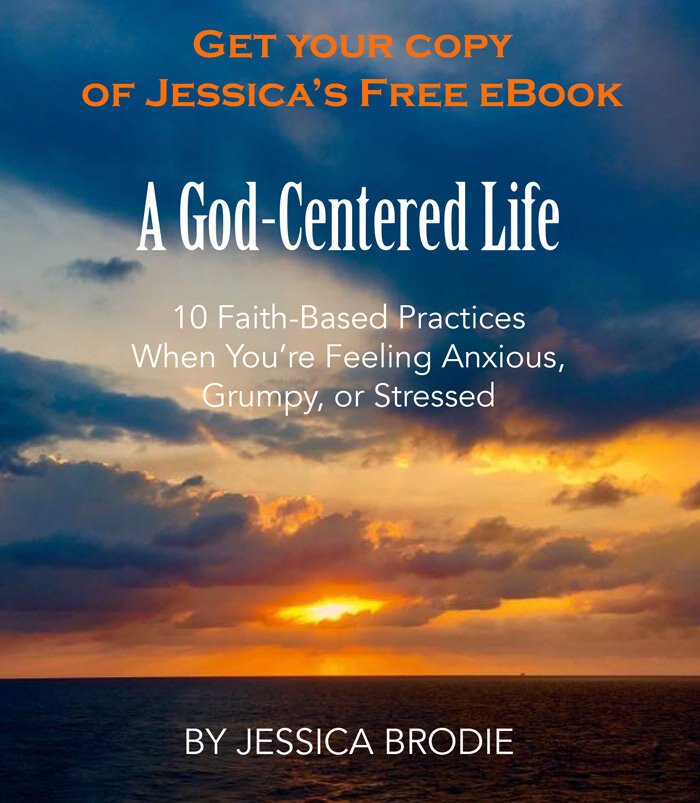By Jessica Brodie
Have you ever felt emotionally on-edge? I had a nasty cold a few weeks ago, and since then, I haven’t been sleeping well. And when I don’t sleep well, my emotions tend to be a bit “extra.” I’m tired, so I don’t have as much control over my feelings, and little things start to feel like big things.
Several years ago, my daughter’s counselor drew an image on a whiteboard of a scale, much like the scales of justice traditionally held by Lady Liberty. On one side she wrote the word “thoughts,” and on the other she wrote “feelings.” Ideally, the counselor said, our “thoughts” and “feelings” scales should be roughly equal. Problems begin when we give too much weight to feelings over thoughts, letting our emotions take over. But when we don’t give enough weight to our feelings, we become like robots, minimizing the emotions that make us beautifully human.
Too much of either is a bad thing.
Our God is mighty, unchanging, everlasting… the calm center in the storm that rages all around us. As perfect Truth, he exists beyond feeling. Yet we mustn’t think for a moment that God is devoid of feeling or that, as Truth, he wants us to strive to repress or minimize our feelings.
Feelings are not bad or wrong. What’s wrong is when we give more weight to our feelings than to logic, thought, and truth instead of striving for equal measure, or when we let our feelings carry us into an out-of-control state.
Throughout scripture, the Bible tells us God experiences powerful feelings. He felt delight when he first created humanity (Genesis 1:31) and later grief over the way his creation went so wantonly astray (Genesis 6:6). He felt pity and compassion when his people experienced oppression (Judges 2:18) and consuming anger when his perfect will and way were opposed (Exodus 15:7-8).
Jesus, the Son of God and described by the apostle John as “Word became flesh” (John 1:14 NIV), is our human version of God, existing as the mystery of both God and man in one. And we know Jesus, too, experienced the full range of human emotion, both weeping at his friend’s death (John 11:35), lamenting his impending crucifixion (Luke 22:44), growing angry at the misuse of God’s temple (Matthew 21:12-13), and even having “too much fun,” as his opponents implied, eating and drinking with people of ill-repute (Luke 7:34).
As humans, we are inherently sinful. As the old hymn “Come, Thou Fount of Every Blessing” tells us, we are sometimes wandering souls, prone to leave the God we love to embrace our own wants and desires. That’s why it’s important that we balance the scales of emotion with an equal dose of thought so we don’t allow our feelings to lead us astray.
But this doesn’t mean our feelings or emotions are bad or wrong. God feels. And we—made in the image of God—feel, too.
So don’t fear your emotions ... but don’t let them rule you, either. Strive for balance in both your thoughts and your feelings so your feelings don’t control you. Self control is key to healthy emotional balance.
Remember:
Proverbs 25:28, “Like a city whose walls are broken through is a person who lacks self-control.”
1 Peter 4:7, “The end of all things is near. Therefore be alert and of sober mind so that you may pray.”
2 Timothy 1:7, “For the Spirit God gave us does not make us timid, but gives us power, love and self-discipline.”
If you know someone who would benefit from reading this blog, please share this with them:
Thanks to my Patreon sponsors: Matt Brodie, Emily Dodd, Kathleen Patella, Billy Robinson, Yancy Rose, and Lanny Turner.
SHARE TODAY’S BLOG ON SOCIAL MEDIA: CLICK HERE OR THE SOCIAL LINKS BELOW.




